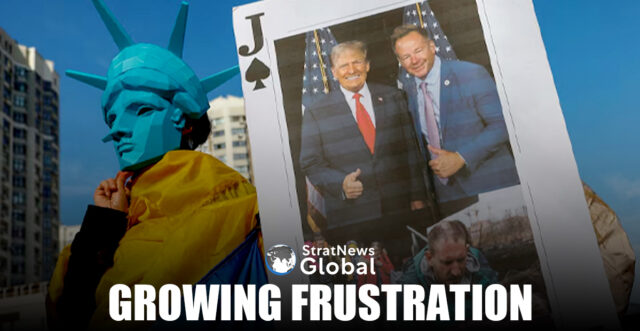Amid growing frustration over Putin’s military assault on Ukraine, some Republicans in Congress and White House advisers are urging President Donald Trump to finally adopt new sanctions on Russia.
Trump has held off on such penalties for months, believing he could have fruitful dealings with Putin to end the war and considering sanctions in general to be overused and often ineffective.
White House officials say Trump still hopes to develop an economic partnership with Russia. He sees sanctions as an escalation in tensions with Moscow that could derail hopes of a ceasefire in the three-year-old conflict.
But his frustration with Putin is genuine and increasingly severe, according to aides. They said he is giving sanctions serious consideration after Russia escalated its attacks in recent days.
“He is always looking at different ways to apply pressure,” a senior White House official said. “This is no different. He’s always weighing his options.”
U.S. officials have prepared new economic sanctions against Russia, including banking and energy measures. They say that the sanctions package is ready to implement based on Trump’s order.
One option supported by some Trump advisers would be for the president to embrace, or at least not obstruct, legislation introduced by Republican Senator Lindsey Graham and Democratic Senator Richard Blumenthal last month that would set a 500% tariff on goods imported from countries that buy Russian oil.
Some advisers believe the bill could be useful because it would allow consequential sanctions to go into effect while Trump could, in essence, tell Putin the sanctions decision was out of his hands, according to one U.S. official with direct knowledge of the matter. That in turn could help Trump maintain a viable line of communication with Putin.
That U.S. official and another person familiar with internal deliberations said the Trump White House believes secondary sanctions – that is to say, sanctions on countries that do business with Russia, not just Russia itself – are needed for them to be effective.
Graham and fellow Republican Senator Chuck Grassley, both close Trump allies, said this week that now is the time to increase pressure on Putin.
“I believe President Trump was sincere when he thought his friendship with Putin would end the war. Now that being the case, IT’S TIME FOR SANCTIONS STRONG ENOUGH SO PUTIN KNOWS ‘game over,'” Grassley said in a social media post on Tuesday.
War Drags On
Trump entered office in January, predicting he would be able to end the war in Ukraine in 24 hours. But in the months since, he has absorbed the grim reality that the conflict is more intractable than he originally believed and has blamed his predecessor, Joe Biden, for allowing it to happen.
Last week, Trump spoke with Putin for two hours and thought he had a deal to begin ceasefire negotiations immediately. Then Russia launched a barrage of drone and missile attacks on Ukraine, prompting Trump to say Putin had “gone absolutely CRAZY” and that he was “playing with fire” by refusing to engage in ceasefire talks with Kyiv.
Speaking to reporters in the Oval Office on Wednesday, Trump explained why he felt imposing sanctions could antagonise Putin.
“If I think I’m close to getting a deal, I don’t want to screw it up by doing that,” he said.
Asked whether Putin wanted to end the war, Trump said, “I can’t tell you that, but I’ll let you know in about two weeks,” noting he was waiting on Russia to submit its latest peace proposal.
“We’re going to find out whether or not he’s tapping us along or not, and if he is, we’ll respond a little bit differently,” Trump added.
Trump has threatened sanctions before, only to back off. He talked about the possibility of sanctions back in January and again before his most recent call with Putin.
Putin said last week that he had agreed to work with Ukraine on a memorandum that would establish the contours of a peace accord, including the timing of a ceasefire. Russia says it is currently drafting its version of the memorandum and cannot estimate how long that will take.
Republicans generally have followed Trump’s lead on foreign policy in the months since he began his second term in office, making their pursuit of sanctions on their own noteworthy.
White House officials have held conversations with Senate Republicans about the contents of the sanctions bill, according to one of the U.S. officials.
Should the Senate bill move forward, there is a bipartisan companion bill in the House of Representatives, although support for Ukraine among House Republicans has been notably weaker than in the Senate.
The European Union, meanwhile, has been ramping up sanctions on Russia. An EU measure adopted last week hit over 130 entities and individuals, and listed 75 new sanctions entities, including major oil firm Surgutneftegaz.
In meetings in recent days in Washington, U.S. officials have said they have no qualms with the new measures, according to one person with direct knowledge of the matter.
(With inputs from Reuters)





